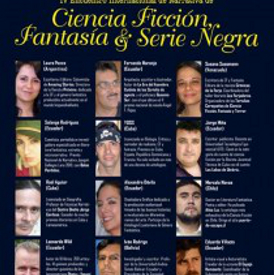
OBIR: Occasional Biased and Ignorant Reviews reflecting this reader’s opinion.

Pulp Literature Magazine #40 Autumn 2023
Published by Pulp Literature Press, Langley, British Columbia, Canada, Autumn 2023.
Managing Editor: Jennifer Landels, Senior Editor: Melanie Anastasiou, Acquisitions Editor: Genevieve Wynand, Poetry Editors: Daniel Cowper & Emily Osborne, Assistant Editors: Brooklyn Hook, Sierra Louie & Ellen Spacey.
Cover art: American Space Force – by Tais Teng
Interior Illustrations – by Mel Anastasiou
Above It All – by Robert J. Sawyer
Premise:
Alone aboard the Mir Space Station, a Cosmonaut kills himself. Why?
Review:
At first, I thought this was an alternative history piece, but then I learn it was originally published in 1996. So, a story involving both Mir and the Space Shuttle Discovery is a contemporary story of its time. Why publish it again? Because now it’s more meaningful than ever.
In the story Astronaut Paul Rackham boards the Mir to recover the body of Cosmonaut Yuri Vereschagin to return him to Earth for burial. A decent gesture between rival space programs. And an opportunity to describe the interior of Mir in detail. It was a magnificent creation in its day, despite a long history of mechanical breakdowns, chemical leaks, failed dockings, power blackouts and even a serious outbreak of fire. One could be forgiven for suspecting Cosmonauts considered suicide as soon as they learned they were next in line to go aboard Mir. Truth to tell, Mir proved that Cosmonauts—and American astronauts, several having flown on Mir—were resourceful and could cope with almost anything. A triumph of sorts.
But Sawyer doesn’t deal with the station’s history. His story explores larger issues that loomed ominously in the 1990s. Has the impact of throwing me back in time amidst numerous heated conversations on the topic. I was close to fisticuffs on several occasions. I won’t say why. Don’t want to spoil the story.
Suffice to say I was surprised the direction the story took. Not what I expected. I would have anticipated a different approach from Sawyer, which probably indicates how shallow my appreciation of his talent may be. I shouldn’t have to remind myself of his depth of research in all his projects and his tendency to explore all angles of a theme or premise. He’s such a clear and precise writer he makes it look easy and simple, when in fact there are often layers upon layers that grow more significant and relevant the more you think about them.
Some people might not like the “message” of this story. It’s not really about Mir, but about what some people were thinking about the future of humanity back then, and many even now. The story functions as a metaphor for a particular point of view, not necessarily in advocacy, but just to equate the reader with the underlying threat we all face if we don’t figure out exactly what it is we are trying to do. Something we need to think about. Which is why Sawyer wrote it.
Feature Interview – Pulp Literature interviews Robet J. Sawyer
Review:
A very revealing interview. Encapsulated by the comment “the notion of Mir—the Russian word for peace—just isn’t relevant today. The idea of American and Russian cooperation in space or anywhere else seems even more implausible.”
In other words, the world is going to hell in a handbasket faster than ever, and for this reason Sawyer explains “Escapist science fiction doesn’t interest me at all; I want to challenge my readers—and challenge myself.”
Well, darn, a bit disappointed I am. The way things are going I crave escapist literature more than ever. The novel I’m writing is definitely in that category. I’m writing what I want to read. That said, I’m going to read Sawyer’s next book anyway. I love concept-driven fiction, and his vision is on a grand level which stirs my sense of wonder even when he’s slapping me on the side of the head trying to get me to wake up. Bit of a lost cause for a somnambulist like me, but I do love what he writes. His writing is addictive. Can’t put it down.
Stella Ryman Takes the Wheel – by Mel Anastasiou
Premise:
What it’s like to be old.
Review:
Yep, that’s the gist of this chapter in the ongoing serial of Stella having stolen a Saab to rescue her friend from a fate worse than death, i.e. been taken from the Old Folks Home they shared to a hospital undoubtedly for the purpose of palliative care or worse. Along the way we are treated to the experience of being an elderly driver who maybe shouldn’t be driving, and then being an elderly shopper who maybe shouldn’t be shopping. Not so much furthering the story as offering a vignette full of character revelation. An exercise in mental fugue.
At 72, I can identify with Stella. Believe it or not, the reason elderly people stare off into space when they should be concentrating on what they’re actually doing—driving, skydiving, running a country, and so on—is because they are distracted by their own thoughts. Seniors constantly review what they’ve done, be it fifty years ago or five minutes ago, in order to figure out… well… figure out what they’ve done, what they’re doing, and where did the cat go? Never mind a crossword puzzle or a book of sudoku, life itself is a constant puzzle with answers annoyingly hard to come by. The mental life of a senior is so hypoactive it’s almost as dire as being a writer. And as for elderly writers… whoosh! A kaleidoscopic tumult of ideas and concepts sucked into the maelstrom of memory loss before they can be fully formed. This is the main reason old people, especially old writers, take lots of naps.
But I digress. This chapter isn’t just about Stella, it’s about you and what you will become if you are lucky enough to live long enough. Worth reading for the insight into your future, and just incidentally, allowing you to share the character’s concerns and motivations. While it might seem to slow the pace, sometimes it’s essential to ignore plot and action to further the reader’s understanding of the protagonist. A useful and sophisticated writing technique when employed properly and seamlessly, as is the case here. Well done.
The Lady M – by Cat Girczyc
Premise:
Not easy being a wer-critter hanging around Vancouver’s Stanley Park. People might notice.
Review:
In my late teenage years, before I moved out on my own, and after partying all evening in Gastown, I used to walk along Stanley Park trails for hours in the middle of the night, my plan being that by the time I came home to the apartment I shared with my mother she would think I was sober. In hindsight, I don’t think my ploy ever fooled her. She was just glad I made it home alive.
Well, the long-lived female wer-critter in this story who sometimes hangs out under the bushes at the tennis courts and sometimes picks up men at the bar in the Stanley Hotel facing English Bay is larking about my old home turf. So, naturally I’m interested in what use she makes of it.
I suppose I should hasten to add I didn’t try to pick up men at the bar, and that the trails in the park had not yet become the all-night gay pickup zone that at least one of them has since become. I, though probably not the city, was quite innocent back then, being the standard pimply adolescent dreaming of gorgeous young nymphomaniacs and hoping steady boozing would lead to the woman of my dreams leaping into my arms. In retrospect watching movies like “Teenagers from Outer Space” or “The Giant Gila Monster” in order to study the pickup lines employed by the horny teenage heroes going after the beautiful girls and their beautiful tight sweaters didn’t do me any damn good at all, but again I digress.
The thing is being a woman wer-critter of an unexpected sort leads to complications in love life hitherto unimagined. Add to this the presence of numerous wer-critters of multiple species who more or less look out for each other, given that full humans can be troublesome seemingly at whim, is a setup full of challenges for the heroine and highly amusing for the reader. It’s a fun story to read. Weirdly optimistic in fact. Entertaining.
The Shepherdess: La Tectume – by JM Landels
Premise:
Who knew a Shepherdess has no idea how to defend a castle?
Review:
Toinette, a shepherdess who dreamed of being a perfume seller in Paris, has had many adventures in this serialized novel. Never had she dreamed of attending the Court of the Sun King, yet fate led her there. Now fate had trapped her in a fortified chateau with, among other high-powered ladies, the Queen of Sweden. Fortunately, they appreciate the fact she has become a murderer. For a commoner, she definitely has her uses.
Worst of all, from Toinette’s point of view, she is not mistress of her fate. Just when she thinks she has everything figured out, life takes an unexpected turn. Even the people she trusts cannot be trusted. It’s almost as if everyone she knows have higher priorities in mind than her desires or even life, as if she’s expendable even though handy to have around. It leaves her frustrated and angry. She resents being both condescended to and marginalized, even if some of her acquaintances are rather fond of her. She insists on having her own way and finds it annoying that others consider this trait charming and cutely quaint.
I guess it all boils down to her having to constantly prove herself if for no other reason than to stay alive, something she has in common with virtually everyone else in this period of history. Perilous times, which make for a fascinating story. I assume she will win through in the end, but at what cost? Stay tuned for future chapters.
The Eternity Machine – by Graham Darling
Premise:
The ultimate mad science experiment is the one that actually works.
Review:
Of course, the mad scientists are working for a university. Who else has unlimited resources unhindered by ethics or morality? Hmm, come to think of it… lots of people. Be that as it may, a university student wakes up in rather unusual circumstances. Before he can understand what has happened, he is rescued, but that’s the last of the good news. He’s merely one survivor among many living in a reality gone mad and impossible to cure. Even worse, he has to listen to lectures by scientists proudly explaining how they buggered things up forever. What can be done about it? Nothing. That’s the beauty of the experiment. It’s irreversible. Not many are happy about this. Still, everyone cooperates in order to survive, a state of affairs which may not last forever. Sometimes unbearable pressure has that effect on people.
Intense attention to detail allows the reader to share the protagonist’s angst and agony. Even better, every conceivable implication of the underlying concept is thoroughly worked out and explored. The disaster is bad enough. The consequences are far worse. Darling’s powers of description bring the prospect of imminent death vividly to life. It’s not merely that doom is inevitable, but that this particular doom is so markedly complex and infuriating. It’s as if fate is saying “I’m going to kill you, but first I’m going to drive you insane with rage over how unfair it all is.” This is a terrific method for escalating tension. Darling is on top of his form every step of the way.
As mentioned earlier, I particularly love concept-driven fiction. This is a masterful, indeed spectacular example of such. Grabs you and never lets you go. My idea of great, gleeful fun (even though it is rather depressing for those involved). Best of all, the ending strikes me as thoroughly Lovecraftian in technique, but works better than it ever did for Lovecraft. Amazing.
THE JACK WHYTE STORYTELLER AWARD:
Bliss Street – by CZ Tacks
Premise:
Vanna inherits a house as rundown and neglected as she had been as a child. Were her parents good for nothing?
Review:
This is a haunted house story with a difference. Something of a one-note theme, but slowly and cautiously elaborated until it becomes a contest of wills crying out for a paradigm shift on somebody’s part, whatever it takes, to resolve the issue. Who blinks first? Or is it simply a case of learning to look at things differently?
To put it another way, the problem is relatively simple at first, yet totally impossible in the real world. It is obvious from the get go that something supernatural is at work, but only if you take it literally. On one level a frustrating encounter with ghostly forces unspecified but definitely irritating and something of a nuisance. On another level, an example of the ghosts one tends to create in one’s mind in reaction to trauma. Really, it’s an essay on the meaning of bad memories and how one copes with them. Low key, but quite interesting and potentially useful to contemplate.
THE MAGPIE AWARDS FOR POETRY
(Winner): octopus boy in winter – by Claire Lawrence
Premise:
About a boy grasping as much as he can.
Review:
A very sad poem. Beautiful, heart-felt, but sad.
(First Runner-Up): How I Earned My Queer Card – by Catherine Lewis
Premise:
There’s a first time for everything, even for a late bloomer.
Review:
If left too late, the first time may open a lifetime of last times. Sometimes first impressions ruin everything. Unless?
(Second Runner-Up): Perimeters – by Mark Cameron
Premise:
Words can be inadequate, even for a poet.
Review:
When in doubt, retreat? An escape, or a necessity? Do all poets have such doubts? Very much a poem about what it means to be a poet.
The Drift – (Graphic Art) by Jordan Bray
Premise:
Be careful when you explore.
Review:
An evocative series of charcoal (?) sketches involving a tiny monk-like figure leaving a decaying medieval city to wander a desert full of ruins in search of paradise, or at least a place where plants grow. He finds many things, some of them quite frightening, and yet hopeful. There may be something better just ahead. If he can survive his terrors.
A surreal journey, a fantasy, but possibly a mood sketch of our journey through life. Interpret as you will. One thing for sure, memorable images. Conjures up all sorts of feelings and emotions. Powerful. Simple, but powerful. I’m impressed.
Where Angels Wait – by CC Humphreys
Premise:
Do you wait till your father is dead to ask him to forgive you?
Review:
Tom is in Granada to find out what the Catholic hospital where his father, an unbeliever, died, did with his body. All his life he prayed for his father. And since his death, has been drowning in guilt and obsession. A very Catholic horror story, with a very Catholic ending.
I’m not at all religious, but the story resonates with me. For personal reasons, which I won’t go into. I’ll just say it moved me deeply.
Jack Absolute – (novel excerpt) by CC Humphreys
Premise:
Waking up with a hangover is one thing, but discovering one has to fight a duel because of words exchanged the night before is a bit much.
Review:
From Humphrey’s 2004 novel “Jack Absolute.” I gather it takes place roughly in the era of Elizabethan England. At any rate, the theatre is where young roughs gather and get into trouble. Having an Iroquois warrior and a starving playwright as one’s best buddies not always an advantage. Makes for interesting conversations though, not to mention unusual situations.
The excerpt is designed to “whet your appetite” for the sequel Humphreys is currently working on titled “The Resurrection of Jack Absolute.” That it does. Splendid name for an adventurer.
CONCLUSION:
There’s a lot of exciting stuff to read in this issue. Exciting in terms of original concepts, sparkling writing, and subtle admonitions to think. Why, you might even wind-up reforming yourself, or at least understanding your future a bit better. At the very least you’ll feel good being exposed to so much excellent writing. It is always pleasant to be entertained. In this case, invigorated. An inspiring issue. I like it.
Check it out at: < Pulp Literature #40 >









